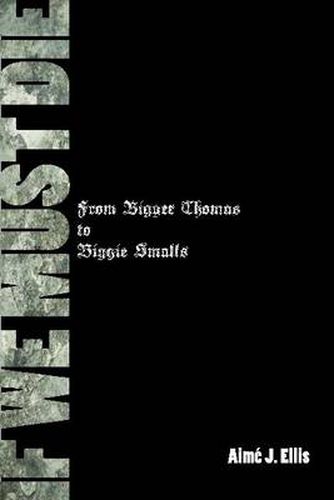Readings Newsletter
Become a Readings Member to make your shopping experience even easier.
Sign in or sign up for free!
You’re not far away from qualifying for FREE standard shipping within Australia
You’ve qualified for FREE standard shipping within Australia
The cart is loading…






In If We Must Die: From Bigger Thomas to Biggie Smalls, author Aime J. Ellis argues that throughout slavery, the Jim Crow era, and more recently in the proliferation of the prison industrial complex, the violent threat of death has functioned as a coercive disciplinary practice of social control over black men. In this provocative volume, Ellis delves into a variety of literary and cultural texts to consider unlawful and extralegal violence like lynching, mob violence, and white riots, in addition to state violence such as state-sanctioned execution, the unregulated use of force by police and prison guards, state neglect or inaction, and denial of human and civil rights. Focusing primarily on young black men who are depicted or see themselves as bad niggers, gangbangers, thugs, social outcasts, high school drop-outs, or prison inmates, Ellis looks at the self-affirming embrace of deathly violence and death-defiance-both imagined and lived-in a diverse body of cultural works. From Richard Wright’s literary classic Native Son, Eldridge Cleaver’s prison memoir Soul on Ice, and Nathan McCall’s autobiography Makes Me Wanna Holler to the hip hop music of Eazy-E, Tupac Shakur, Notorious B.I.G., and D'Angelo, Ellis investigates black men’s representational identifications with and attachments to death, violence, and death-defiance as a way of coping with and negotiating late-twentieth and early twenty-first century culture. Distinct from a sociological study of the material conditions that impact urban black life, If We Must Die investigates the many ways that those material conditions and lived experiences profoundly shape black male identity and self-image. African Amerian studies scholars and those interested in race in contemporary American culture will appreciate this thought-provoking volume.
$9.00 standard shipping within Australia
FREE standard shipping within Australia for orders over $100.00
Express & International shipping calculated at checkout
In If We Must Die: From Bigger Thomas to Biggie Smalls, author Aime J. Ellis argues that throughout slavery, the Jim Crow era, and more recently in the proliferation of the prison industrial complex, the violent threat of death has functioned as a coercive disciplinary practice of social control over black men. In this provocative volume, Ellis delves into a variety of literary and cultural texts to consider unlawful and extralegal violence like lynching, mob violence, and white riots, in addition to state violence such as state-sanctioned execution, the unregulated use of force by police and prison guards, state neglect or inaction, and denial of human and civil rights. Focusing primarily on young black men who are depicted or see themselves as bad niggers, gangbangers, thugs, social outcasts, high school drop-outs, or prison inmates, Ellis looks at the self-affirming embrace of deathly violence and death-defiance-both imagined and lived-in a diverse body of cultural works. From Richard Wright’s literary classic Native Son, Eldridge Cleaver’s prison memoir Soul on Ice, and Nathan McCall’s autobiography Makes Me Wanna Holler to the hip hop music of Eazy-E, Tupac Shakur, Notorious B.I.G., and D'Angelo, Ellis investigates black men’s representational identifications with and attachments to death, violence, and death-defiance as a way of coping with and negotiating late-twentieth and early twenty-first century culture. Distinct from a sociological study of the material conditions that impact urban black life, If We Must Die investigates the many ways that those material conditions and lived experiences profoundly shape black male identity and self-image. African Amerian studies scholars and those interested in race in contemporary American culture will appreciate this thought-provoking volume.